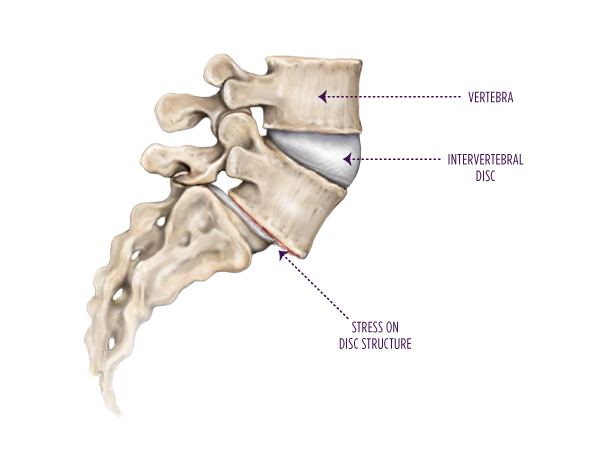What is spondylosis?
Spondylosis, also known as spinal osteoarthritis, is a general term for wear and tear that affects the spinal bones and discs in your neck and back. Spondylosis is a degenerative disorder that may affect the:
- Neck (cervical spine)
- Middle of the spine (thoracic spine)
- Lower back (lumbar spine)

What causes spondylosis?
Spondylosis is caused by changes to the bones and cartilage in the back and neck. These changes may be caused by:
- Dehydrated discs
- Herniated (ruptured) discs
- Bone spurs
- Stiff ligaments
What are the symptoms of spondylosis?
Many people with spondylosis do not have symptoms. Essentially everyone has some amount of degeneration of their spine as they age. When symptoms do happen, they can include:
- Pain, particularly in the lower back, which is often mistaken for a muscle strain
- Muscle spasms
- Overall stiffness in the back
- Changes in posture
How is spondylosis diagnosed?
To diagnose spondylosis, your physician will review your health history and perform a physical examination. To confirm the diagnosis, your doctor will likely recommend diagnostic imaging such as an X-ray, MRI, or CT scan.
- X-rays can show bone spurs on the spine or thickening of the joints that connect the vertebrae to each other
- MRI scans can determine whether you have a herniated disc or pinched nerves
- CT scans of the spine can show narrowing of the spinal canal (spinal stenosis) and give information about the bony structure of the spine
How is spondylosis treated nonsurgically?
Treatment for spondylosis is nearly always conservative. Nonsurgical treatment options include:
- Medication
- Injections
- Lifestyle modifications
- Physical therapy
- Self-care, including rest, exercise, and bracing
- Alternative therapies such as massage, yoga, and acupuncture
In very rare cases, surgery may be beneficial.
What can I do at home to help relieve the symptoms of spondylosis?
In many cases, changing posture and using spinal injections can control the symptoms of spondylosis for a long period of time. Taking anti-inflammatory medicines may also help, especially ibuprofen products like Advil or Motrin.
Summit Orthopedics offers comprehensive spine expertise
Summit’s spine care team is recognized by the National Committee for Quality Assurance for the comprehensive expertise of our patient-centered care. Our back specialists diagnose spine problems and design custom treatment plans built on a conservative, nonsurgical approach. Most patients find relief through treatments including guided injections, specialized physical therapy, biofeedback, exercise, activity modification, and medication. When conservative care does not relieve symptoms, our highly skilled surgeons offer proven, evidence-based surgical options. Together with you, we will determine the right course of action.
Start your journey to a healthy spine. Find your spine expert, request an appointment online, or call us at (651) 968–5201 to schedule a spine consultation.
Summit has convenient locations across the Minneapolis-St. Paul metro area, serving Minnesota and western Wisconsin. We have state-of-the-art centers for comprehensive orthopedic care in Eagan, MN, Vadnais Heights, MN, and Woodbury, MN, as well as additional community clinics throughout the metro and southern Minnesota.
More resources for you
- Visit our Spine Exercise Libraryfor options to help ease neck and back pain
- See Summit’s treatment optionsfor neck, back, and spine care
- Check out additional information on Summit’s approach to spine care
